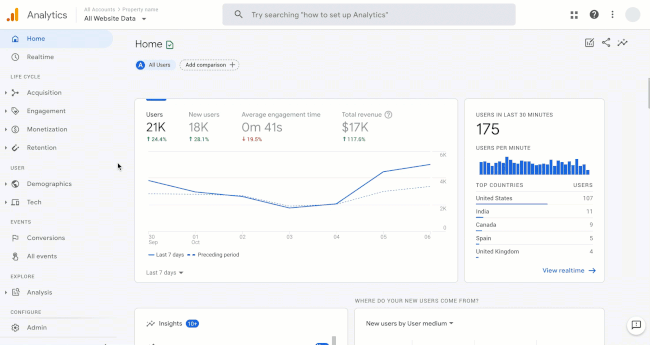![]()
Google last week announced the release of Google Analytics 4, which has AI and machine learning at its heart. Based on the App + Web Google introduced in beta last year, it’s Google’s vision for the future of analytics in a more privacy driven world.
“It’s privacy-centric by design, so you can rely on Analytics even as industry changes like restrictions on cookies and identifiers create gaps in your data.”
It provides a more holistic, cross channel view of your data, along with smart predictions that enable you to act more proactively on these insights.
Here are the key new features.
Smarter insights and predictions
With the application of existing machine learning models, the new Analytics can automatically alert you to significant data trends, such as a sharp rise in demand for certain products.
Predictive metrics such as calculating churn probability or potential revenue from a particular customer group can help you anticipate customer actions and take proactive steps, such as investing in customer retention or focusing on higher value customers.
![]()
Image source: Google
Deeper integration with Google Ads
The new Analytics can now measures integrations across the web and apps, which means it can report on conversions such as YouTube engaged views that occur in-app and on the web.
![]()
Image source: Google
This provides a much more complete view of your marketing efforts. Seeing conversions from YouTube video views, alongside those from Google and non-Google paid channels, Search, social, and email, will help you understand the combined impact of all your marketing efforts.
Customer-centric data
The new Analytics has moved from measurement broken down by device or by platform to customer-centric measurement, designed to give users a more complete picture of how customers interact with their business.
It uses multiple identity spaces, including marketer-provided User IDs and unique Google signals from users opted into ads personalization. For example, you’ll be able to see if a customer first discovers your business from an ad on the web, then later installs your app and makes purchases there.
The aim is to give you a better understanding of your customers across their entire lifecycle, from acquisition through to conversion and retention.
Google says they’ve simplified and reorganized reporting based on user feedback, so it’s easy to find insights based on the part of the customer journey you’re interested in.
“For example, you can see what channels are driving new customers in the user acquisition report, then use the engagement and retention reports to understand the actions these customers take, and whether they stick around, after converting.”

Image source: Google
Data control
More granular data controls will help users to manage how data is collected and retained, and comply with data regulations such as GDPR. They can also be used to specify how data is used for advertising.
“More granular controls for ads personalization let you choose when to use your data to optimize your ads and when to limit your data use to measurement.”
Google says the new Analytics is designed to adapt to a future with or without cookies or identifiers.
“It uses a flexible approach to measurement, and in the future, will include modeling to fill in the gaps where the data may be incomplete.”
Google Analytics 4 is now the default for new properties. Google is recommending that users create a new Google Analytics 4 property in parallel with existing properties, and their help guide for doing this is here. Future investment will be focused on Google Analytics 4.